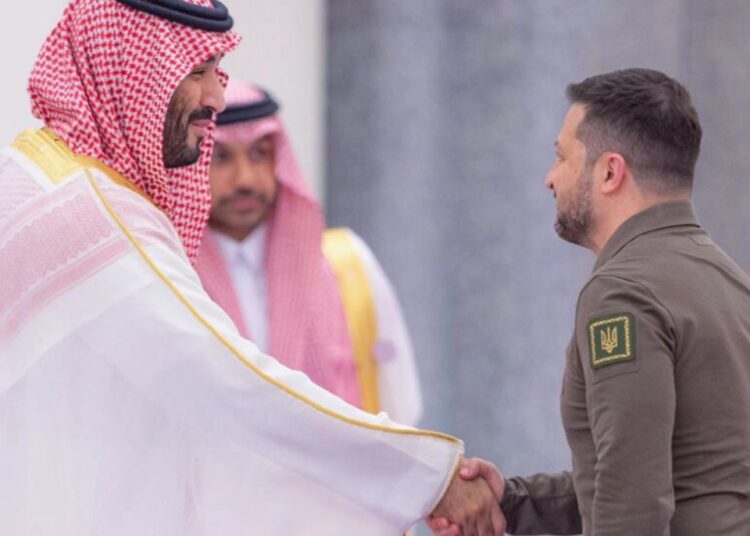Saudi Arabia is presently staging peace negotiations associated with the Ukraine war. Delegates from approximately 40 countries, notably including the United States and China, have congregated in Jeddah to attentively participate and supervise these dialogues. Anterior media conjectures suggest the ensuing discussions, which are anticipated to continue into the morrow, will encompass a spectrum of ten subtopics such as food and energy security, the liberation of captives, environmental protection, and potentially even establishing a tribunal for war crimes.
Despite the extensive gamut of these deliberations, a number of observers grapple with several probing inquiries. What catalyzed Saudi Arabia’s decision to intervene diplomatically between these two sides? How has Saudi Arabia managed to conduct this meeting, in the face of other prospective mediators like China, Turkey, Brazil, and various African countries expressing interest in mediating? What tangible impacts will the Jeddah gathering yield on the Ukrainian conflict?
Saudi Arabia’s motivation for mediation
The global observers largely concur on Saudi Arabia’s strategic shift both regionally and globally. They interpret multiple foreign policy maneuvers directed toward Iran, the United States, China, Turkey, Syria, and others as endeavors to enhance Saudi Arabia’s status on the world stage. Undertaking mediation efforts in the Ukrainian conflict is viewed as a continuation of these initiatives. Once accused of backing terrorist factions and unleashing proxy conflicts, Saudi Arabia now seeks not only reconciliation with historical rivals but also peace-related involvement in a preeminent global crisis. Regardless of the outcome of the Ukrainian negotiations in Jeddah, Saudi Arabia’s transformative role will indubitably accrue benefits and accomplishments for Riyadh.
Setting Saudi Arabia apart from other mediators
Prior to Saudi Arabia’s involvement, other key players like China, Turkey, Brazil, certain African countries, and even Iran had expressed willingness to mediate between Russia and Ukraine. However, the United States’ vehement dissent curtailed such international meetings. Some analysts indicate Saudi Arabian neutrality in the Ukraine conflict or the kingdom’s amicable relationships with the conflicting parties, traits shared with some of the volunteers for mediation. However, the critical element was the unwillingness of the United States to assign this task to any of these countries, Turkey included.
One can discern a notable correlation between the visit of Jake Sullivan, the US national security adviser, to Jeddah, and Saudi Arabia’s subsequent declaration of intent to convene an international peace summit on the Ukrainian conflict. As suggested by Western media, Saudi Arabia has been inundated with requests from the United States concerning its stance regionally and globally, yet has maintained stringent conditions for Washington. Thus, US enabling Saudi Arabia to spearhead these peace talks serves as an attempt to further foster political proximity between Riyadh and Washington.
Indeed, while the Saudi-led Ukraine negotiations’ agenda appears more practical than previous proposals, such as China’s broader plan, the pivotal factor for conducting this meeting remained the consent of the United States.
What to expect from Jeddah summit?
Curiously, the Ukraine negotiations in Saudi Arabia lack a representative from Russia. Nonetheless, it is proposed that this gathering will debate a gamut of ten sub-topics, namely, food and energy security, the discharge of captives, environmental safeguarding, and potentially, the creation of a war crimes tribunal. It appears that this dialogue is chiefly geared toward curating a policy package for Russia’s perusal. Saudi Arabia has communicated its intent to brief Russia on the conclusion of these discussions. A selection of analyst envisage that Riyadh’s existing oil agreements with Moscow may afford Saudi Arabia the leverage to coax Russia into complying with parts of the resolutions derived from the Jeddah conference concerning the Ukraine conflict. Given this fortuitous alignment, it is plausible that Russia may demonstrate an interest in implementing at least a portion of these recommendations, contingent on Saudi Arabia’s negotiations.
An additional point of considerable importance is that the Ukraine war has a profoundly intricate scope, grounded in the depths of historical, geopolitical, and ideological discord between Russia and the West. This entanglement has resulted in Ukraine’s peculiar situation, where typically, an emissary from the United Nations and the Security Council is assigned to orchestrate mediation efforts and diffuse tensions in any international crisis. However, such tradition has not extended to the Ukraine scenario. In effect, Saudi Arabian mediation, or intervention from any other entity, is currently confined to ensuring the dispute does not deteriorate further, even contributing to an extended war of attrition.
Furthermore, it is vital to highlight that the Jeddah talks did not broach the subject of territorial and geopolitical disputes, which stand as primary hindrances to peaceful resolutions and indeed, the root causes and drivers of the conflict. It is clear that the Saudi orchestrators of these Ukraine peace discourses possess the insight to understand they should not anticipate a definitive cessation of conflict between the Russian and Ukrainian sides as an outcome of the Jeddah gathering.






